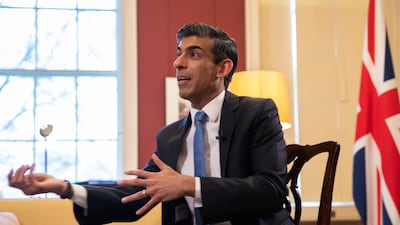Tory leadership candidate Rishi Sunak on Wednesday promised to scrap plans to build more wind farms on the British mainland, in a play for support from the party's wealthy, homeowning base.
Mr Sunak, who is almost certain to make the final vote among the 200,000-strong Conservative membership, said he would focus instead on offshore wind as he set a target of 2045 to make Britain energy independent.
He said he would respond to the energy crisis caused by Russia's invasion of Ukraine by re-establishing a dedicated energy department and creating a task force to cut bills.
But cautious plans announced in April to build onshore wind farms in "a limited number of supportive communities" would be rolled back if he becomes prime minister, Mr Sunak said.
His campaign said offshore wind power was cheaper than ever and that turbines off the coast were "bigger and more productive" than wind parks on land.
Onshore wind is unpopular among some Conservative MPs and members, and the electorate that will choose the next party leader is disproportionately made up of affluent homeowners who are often sceptical of wind farms.
Mr Sunak's team said the former chancellor recognised the "distress and disruption that onshore wind farms can often cause".
"Wind energy will be an important part of our strategy, but I want to reassure communities that as prime minister I would scrap plans to relax the ban on onshore wind in England, instead focusing on building more turbines offshore," he said.

The updated energy strategy in April ― published when Mr Sunak was in the Cabinet ― set out plans to expand offshore wind so that it can eventually power every home in Britain, with planning rules to be relaxed.
It also made the case for an expansion of nuclear power, with a new body called Great British Nuclear appointed to oversee the construction of up to eight reactors at the rate of one a year.
Mr Sunak did not take a position on another divisive energy source, shale gas fracking, after the government commissioned a new technical review on the subject.
A Sunak ally, former minister Robert Jenrick, said Mr Sunak was committed to net zero emissions by 2050 but said: “We’ve got to make sure we keep the public with us on that path.”
His energy pitch came hours before Conservative MPs vote in the final round of balloting. Mr Sunak has led at every stage and it would be a sensation if he failed to make the last two.
His two remaining rivals, Liz Truss and Penny Mordaunt, were in a close race for second place and bidding for support from backers of Kemi Badenoch, who was eliminated on Tuesday.
Ms Truss said she would suspend a green levy to bring down the cost of fuel bills, as well as reversing an increase in national insurance that she had publicly supported but now says she opposed in private.
"I am the only person who can deliver the change we need on the economy ― in line with true Conservative principles," she wrote in the Daily Telegraph.
Ms Mordaunt, who takes a narrow lead over Ms Truss into the final round, said she would bring in "targeted tax cuts" to lower bills as she made a raft of policy announcements in the final hours of hustings.
"We need to act now, and not sit on our hands by proclaiming we have done enough, during the height of this crisis, and come this autumn, to help people pay their bills," she said.
But in a swipe at rivals, she said: "I have sought to retain the party’s reputation for sound money, which could be lost easily, by not participating in an uncovered Dutch auction of tax cuts, which, while sounding nice, are not credible."












































































